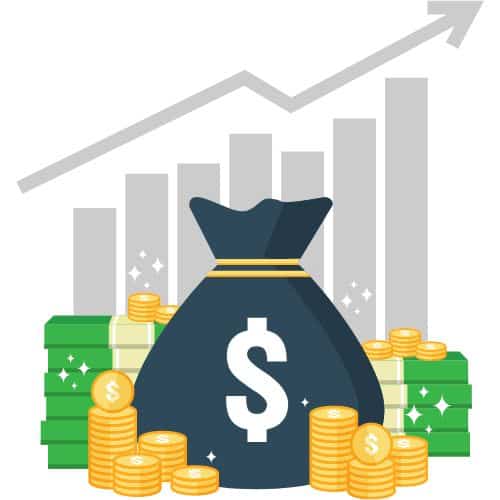
The information contained in this article not intended to be a substitute for legal or financial advice that can be provided by your own attorney, accountant, and/or financial advisor.
For many investors, ETFs or Exchange Traded Funds are an easy way to invest your hard-earned money. Why? Because they provide exposure to a basket of stocks or assets while also providing defence against the volatility of owning individual stocks.
But if you’re like me you might be wondering: how do index funds make money? I did some research and here is what I found!
Every index fund, whether it is an ETF or a mutual fund, charges a management fee. It is often referred to as the MER or Management Expense Ratio. ETFs are great but they are an asset that is managed and provided by a for-profit company. Some of these companies include Blackrock iShares, Vanguard, or even Canadian banks like BMO.
The fees that these companies charge provide revenue from each holder of the index fund. They might not seem like a lot, but the MER fees can really add up quickly with billions of dollars under management.
Let’s take a deeper look into how index funds work and how they can be profitable for their providers.
How do Index Funds Make Money?
For the providers that offer index funds to investors, much of the revenue is made from the MER fees. Every ETF or mutual fund comes with one, although ETFs are typically much cheaper because they are more passively managed.
Consider an index fund which really only acts to mimic a broader exchange like the S&P 500, the NASDAQ, or the S&P/TSX. The fund manager does not have a lot of work to do aside from matching the transactions of the broader index.
The average MER for a Canadian ETF is between 0.25% and 0.75%. On the other hand, index fund ETFs like the Vanguard FTSE Canada All Cap Index ETF (TSE: VCN) have a very low MER at just 0.05%. Another example is the BMO S&P/TSX Capped Composite Index ETF (TSE: ZCN) which has a low MER of just 0.06%.
So how exactly does the MER work?
The percentage is lower but what does it really mean? The MER is a fee based on every ten thousand dollars you have invested. So the MER on a $10,000 investment in the VCN ETF would be $5.00 per year.
As of December 2022, VCN has total assets under management of nearly $5 billion. Some quick math shows us that Vanguard makes $250 million per year on fees from VCN alone! Vanguard Canada has 43 total ETFs alone, with many of these funds charging MERs that are well over 0.05%.
Is it Profitable to Invest in Index Funds?

Look, a lot of people simply do not have the time to research and keep up with individual companies. Even Warren Buffett says that most investors are better off owning a portfolio of low-cost index funds. If the Oracle of Omaha thinks investing in index funds is good enough, then we should too!
To answer the question, yes it can be profitable to invest in index funds. Remember that index funds simply track the performance of a major index. While your returns won’t match the performance of the index exactly, they will be close enough. Consider two ETFs that track the S&P 500 index: VOO and SPY. Checking their year-to-date returns we can see that VOO has returned a loss of 21.19%, while SPY has returned a loss of 21.15%.
Let’s also keep in mind that for the most part, ETFs are a long-term investing asset. We want our returns and dividends to compound over time as we continue to add to our positions.
Since its inception in 1957, the S&P 500 index has provided an average annual return of a little less than 10%. We can expect more or less the same if we hold an S&P 500 index fund over the long term.
Are Index Funds Better than Mutual Funds?

If you are comparing an index fund ETF to an index mutual fund then the answer is usually going to be yes. Why? Because mutual funds typically have much higher MER fees than ETFs do. Index fund ETFs are also easier to understand because they trade actively throughout the session as stocks do. Mutual funds only trade at the beginning and end of the session so it can be difficult to determine which price you are buying at.
But the main reason that index funds are better than mutual funds leads back to the fees.
The average MER for mutual funds in Canada sits at about 2.0%. Now index mutual funds have a lower MER but you can still expect to pay upwards of about 0.20% for the cheapest mutual funds. A difference of 0.15% might not seem like much but it can add up over time!
At the end of the day, invest in the assets that you understand. This isn’t meant to be financial advice. Some people might prefer the way you can invest a lump sum into mutual fund units rather than buying shares of an ETF.
I’m just here to tell you that ETFs typically come with a much lower fee and it might be the difference between a few hundred or even a few thousand dollars down the road!
The Bottom Line: How do Index Funds Make Money?
While there are certainly other ways in which companies like Vanguard or Blackrock make money, the primary way that they do it from index funds is through the MER fees. These are annual fees that are paid by anyone who owns shares in the ETF.
Index funds tend to have lower fees than other funds, but this also makes them more popular to invest in. The bottom line is you should always look for ETFs with the lowest fees to keep more of your gains in the future!
Geek, out.






